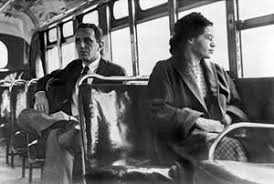Because of how 2019 plays out this year the past weekend as well as today have offered some great events work recognizing:
-
February 2 was Groundhog Day – Punxsutawney Phil emerged from his burrow around 7:30 a.m. ET and did not see his shadow, predicting an early spring for us all. “Faithful followers, there is no shadow of me and a beautiful spring it shall be,” a member of Phil’s Inner Circle read from the groundhog’s prediction scroll to the cheers and applause from the crowd.
-
February 3 was Super Bowl Sunday and in the lowest scoring game of Super Bowl History, the New England Patriots were victorious over the L.A. Rams.
-
February is Black History Month.As we consider the important and unique contributions of African Americans, on today, on what would have been her 106th birthday, we recognize the life and legacy of Rosa Parks. Remembering her unique and personal contribution to the Civil Rights Movement as well as her seminal participation in the Montgomery Bus Boycott, and take her reminder that all of us have a role to play in the movement for inclusion and freedom. Rosa Parks Day
-

Tonight we usher in Lunar New Year and Welcome Good fortune in the Year of the Pig! Gung Hee Fat Choy!
As Problem Drinking Rises In Older Americans, Geriatrician Offers Tips For Those Who Imbibe Over 65 | Forbes
Launched in 2010 by scientists at the National Institute on Drug Abuse (NIDA), National Drug and Alcohol Facts Week® (NDAFW) is a health observance week for teens that aims to Shatter The Myths® about drug and alcohol use. But as it turns out, older adults might just benefit from a refresher course on the subject, as research shows they’re drinking more than ever.
Tackling a common problem for astronauts and the elderly: loneliness | Politico
Elderly Americans living alone and astronauts heading to Mars may not seem to have much in common. But different corners of the government are working together to solve a challenge both groups face: loneliness. NASA is partnering with the Department of Health and Human Services and its National Institutes of Health to find ways to help both groups. Facilitating that cooperation falls to Christopher Austin, the director of the National Center for Advancing Translational Sciences at NIH who also serves as the Health and Human Services liaison to NASA.
Nigeria Passes Disability Rights Law | Human Rights Watch
On January 23, Nigeria’s President Muhammadu Buhari signed into law the Discrimination Against Persons with Disabilities (Prohibition) Act, 2018, following 9 years of relentless advocacy by disability rights groups and activists. According to the World Health Organization’s 2011 World Disability Report, about 15 percent of Nigeria’s population, or at least 25 million people, have a disability. Many of them face a number of human rights abuses including stigma, discrimination, violence, and lack of access to healthcare, housing, and education.
Trump administration proposes big changes in how prescription drugs are priced | The Washington Post
The Trump administration on Thursday proposed bringing transparency to one of the most secretive aspects of drug pricing by ending the widespread practice of rebates to middlemen — an effort to reduce what consumers pay for prescription medicine. Under draft rules announced by Health and Human Services Secretary Alex Azar, drug manufacturers would be allowed to offer discounted prices directly to consumers but would no longer be able to give rebates to the middlemen, known as pharmacy benefit managers.
Opinion: Disability must be considered in auto development | The Detroit News
Saturday marks the opening of the 2019 NAIAS Detroit Auto Show, led by its presentation series on the future of the automobile, Automobili-D. Conference attendees can expect panels on innovations such as vehicle to infrastructure connectivity, urban mobility, smart cities, building a mobility workforce, ride sharing, cybersecurity and autonomous technologies.
Using Rideshare Services Isn’t Easy When You Have a Service Animal. That Needs to Change.| Rooted in Rights
My service dog, Pico, is a representation of freedom and independence that I might not otherwise have. Being his handler has brought me into a realm of disability advocacy I am grateful for: I am an ambassador for Canine Companions For Independence and an advocate for the estimated 385,000 working service dog teams across the United States. For the nearly five years I’ve worked with Pico, one of the biggest struggles we’ve encountered is using rideshare services like Uber and Lyft. An estimated 53 percent of the U.S. population has used a ride-hailing platform. Globally, Uber and Lyft complete 16 million rides daily, with Uber taking roughly 70 percent of the market share to Lyft’s 30 percent. Yet for people with disabilities, these platforms are riddled with problems and rooted in a culture of ableism. And as Ferris Bueller reminds us, -isms are not good. To make matters worse, I am not the walrus. and I can’t even pay for rides, much less bum them.
The information and links provided here are a courtesy. The National Advisory Board does not necessarily endorse or share the views contained in any article, report or web site. No link provided here should be considered an endorsement of any opinion, product or service that may be offered in the article or at the linked-to site.


